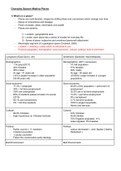1) What’s in a place?
- Places are multi-faceted, shaped by shifting flows and connections which change over time
- Nexus of connections and linkages
- Flows of people, ideas, information and wealth
- Places are dynamic
1) Location: geographical area
2) Locale: each place has a series of locales for everyday life
3) Sense of place: subjective and emotional (personal) attachment
- Meaningful segment of a geological space (Creswell, 2008)
- Location + meaning = place which is individual to you
- Physical geography, demographic, socio-economic, cultural, political, built environment
Lympstone (East Devon, UK) Smethwick (Sandwell, West Midlands)
Demographics: Demographics: (2011 consensus)
- 1.7k (pop) [2011] - 14,146 population
- 44% females - 51% females
- 56% males - 49% males
- Av age - 41 years old - Av age - 36 years old
- (14%) Largest increase in older population - (10-60%) Large increase in younger
(50-59 years old) populations
Socio-economic: Socio-economic:
- 77.3% = employed - 45.6% of the population = some form of
- 35% = full time employment employment
- 3.8% are unemployed - 32.2% are in full time employment
- 60% of students passed at least 2 A-Levels - 13.4% = part time employment
(2015) - 8% unemployed
- 66.1% are homeowners - 3.7% full-time students
- 5% = full time students - 1678 in single households
- Admin and services
Cultural: Cultural:
- 66.9% Christian - 43% Christian
- High importance on Christian festivals - 45.9% British
- 75% England-originated, 11%
india-migrated, 3% Pakistan
Political: Political:
- Parish council = 11 members - Labour dominated = John Spellar [ Warley
- 2 district councillors Parliament ]
- 1 county councillor
- Follow the conservative party ideology
Built Environment: Built Environment:
, Changing Spaces Making Places
- Many old buildings - have been redecorated and - Terraced houses - Transport linking (trains,
rebuilt to modernize them tramps, bus lines) to main city
- Constant protesting to protect old architecture - Industrial town
such as historic churches - Many primary and higher education
- Former low-order shops have been closed and schools
converted to residents with new house - Religious Institutions: Akrill methodist
constructions on cliff tops church, Guru Nanak Gurdwara, Masjid
Usman Mosque
- Smethwick Galton bridge and Smethwick
Canals
Natural Environment: Natural Environment:
- Located in a small valley cut by Wootton Brook - Various Parks: West Smethwick Park,
through the red Breccia cliffs on the Exe Estuary Victoria park
- Tidal mudflats - Nature Reserve
- Small pebble beaches around the foot of the cliff - Smethwick junction
- Small valleys crossing the estuaries - Smethwick Nature Reserve
- Inner city deprived area
- The Smethwick Summits
Past Connections: Past Connections:
- Saxon established-town, which forced out the - Industrial town : meaning after WW2, the
Celts UK needed workers: so people from Asia,
- 13th century: it was one of a number of small The Carribean, Europe and Africa were
ports operating under the administration of invited over to work [post WW2 migration]
Exeter. This means that the Estuary was used
for fishing and railway business
Present connections of Lympstone: Present connections of Smethwick:
- Top-heavy age structure - Direct links to town centre and very close
- Not racially diverse to the M6 - linking other cities
- Christian Ethos
Shift Flows: Shift Flows:
- Strong economy = Universities, HQ of advanced - People = post WW2 - largely influenced by
technology companies other cultures (places of worship,
- Train links - Commute between Exeter and restaurants etc)
Exmouth - Resources = used to be a farming
- Decline of farms dominated town, but since the 19th
- MET office century it has become an industrial area
- Knowledge based firms (Chance Brothers - glass works became a
- Quiet Village on weekends - loss sense of national company)
communication value - Money and investment = large investment
in education and various schools,
investment into transport over the years -
from canals to train stations and non roads
,Changing Spaces Making Places
https://www.streetcheck.co.uk/postcode/ex85lx
https://www.sandwelltrends.info/wp-content/uploads/sites/5/2018/06/Census_TP_2011Smet
hwick.pdf
2) How do we understand place?
- People experience, see and understand places in different ways that can change over time
, Changing Spaces Making Places
Definition: the ability to understand the world around us, via our senses, to accumulate idiographic
perceptions and attention
Our culture, personal background and socio-economic level influences how we perceive/ interpret
our local area / immediate environment.
Factors affecting perception:
Gender
Religion
Age
Sexuality
Role Performed
Gender:
- Traditional gender division of labour where men and women have different public and private
spaces
- Females worry about safety - Geography of Fear (originate at home cooking and cleaning)
- Males don't worry as much (originate in the workplace and pubs for leisure)
- Architects and planners are given the issue of safety of higher priority when making
decisions about the layout of places
Religion:
- Religion may prevent you from doing/going to certain places that goes against religious
values
- Drawn to certain places due to religious teachings, historical references and ‘holy’
perceptions
- Spirituality (native religions) of places for people in any place deemed sacred
Age:
- Life cycle - progress of a person through various stages based on age and family unit, from
infancy to old age
- Shopping centre: children see it as a day out, teens see it as a leisure space, adults see it
as a chore and financial burden and the elderly see it as a dangerous place due to the lack
of fear and accessibility
Sexuality:
- People of the same sexual orientation tend to cluster together in LGBT zones with gay
friendly bars
- Gay village - homosexuals feel safe away from homophobics whilst homophobics see it as a
unusual negative way of living
- ECONOMIC ASPECT - Pink pound: Rebranding areas and houses for LGBTQ communities
to generate tourism
- Residents feel like it is more of a tourist attraction than a community = geography of fear



